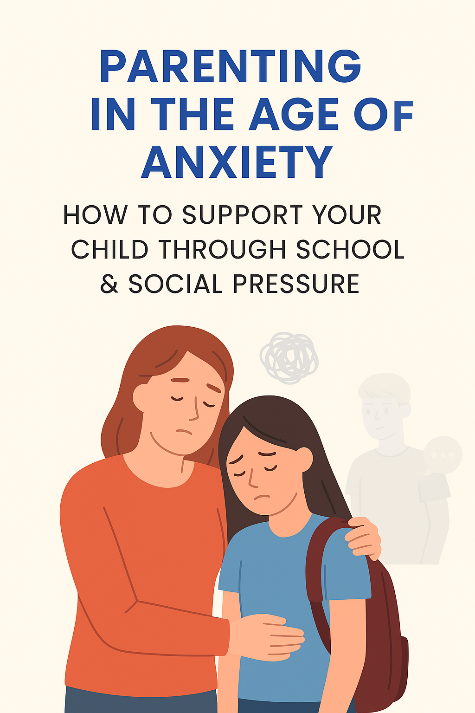In today’s, the challenges our children face extend far beyond traditional academic pressures. With technology at our fingertips, social media influencing self-worth, and the relentless pace of modern life, our kids are increasingly exposed to sources of anxiety and stress. As a psychological expert, I have observed that effective parenting in this era means not only addressing academic needs but also fostering emotional resilience and psychological well-being. This comprehensive guide offers insights and actionable strategies to help parents support their children as they navigate the complexities of school and social pressures.
Understanding Modern Childhood Stress
Modern children and adolescents are growing up in a world where the expectation for academic excellence is intertwined with the constant connectivity of digital life. The pressures of competitive school environments, coupled with the omnipresent influence of social media, can lead to a heightened state of anxiety. Research indicates that chronic stress in children can impair cognitive function, hinder emotional regulation, and even affect physical health. These findings underscore the urgent need for parents to become proactive in mitigating these stressors.
The Impact of School Pressure
For many students, academic success is not just a personal goal—it’s a prerequisite for future opportunities. The burden of high expectations, standardized testing, and college admissions can create a constant sense of pressure. Children often internalize these pressures, leading to anxiety that manifests as perfectionism, fear of failure, and self-doubt.
The Social Media Dilemma
Social media platforms offer a double-edged sword. While they provide avenues for creativity and connection, they also expose children to relentless comparison, cyberbullying, and unrealistic portrayals of success. The curated nature of online lives can distort self-perception and amplify feelings of inadequacy. In this digital era, parents must help their children develop a balanced perspective on online interactions and maintain a healthy self-image.
The Role of Parents in Navigating Anxiety
Parents are the cornerstone of emotional support. Your role as a caregiver extends into the realm of mental health, where modeling calm, resilience, and empathy can profoundly influence your child’s response to stress. Here are several strategies that can empower both you and your child to navigate the turbulent waters of modern anxiety.
1. Foster Open Communication
Creating a safe space for dialogue is crucial. Encourage your children to share their fears, concerns, and experiences without the fear of judgment or immediate correction. When children feel heard and validated, they are more likely to express their anxieties and work through them collaboratively with you.
Effective Strategy: Establish regular “talk time” during the day or week where you can discuss emotions, challenges, and successes. Listen actively and empathize with their feelings rather than dismissing or minimizing their experiences.
2. Model Healthy Stress Management
Children learn by observing. Your behavior sets a powerful example of how to handle stress. By openly discussing your own stress management techniques—such as mindfulness, exercise, or creative outlets—you provide a practical roadmap for your child to emulate.
Effective Strategy: Share your daily routine that includes moments of relaxation, meditation, or even simple breathing exercises. Explain how these practices help you stay grounded during stressful times, and consider engaging in them together as a family.
3. Encourage a Balanced Lifestyle
A well-rounded life is the antidote to anxiety. While academics and digital engagement are important, so too are physical activities, creative pursuits, and downtime. Encourage your child to pursue hobbies, spend time outdoors, and maintain a balanced schedule.
Effective Strategy: Develop a family schedule that includes designated times for study, play, and relaxation. Ensure that there is ample time away from screens and that physical activities are a regular part of the daily routine.
4. Set Realistic Expectations
The pressure to achieve perfection can be debilitating. Help your child understand that it’s okay to make mistakes and that failure is an essential part of growth. By setting realistic expectations, you help alleviate the internalized pressure to be flawless.
Effective Strategy: Celebrate effort over outcomes. Focus on progress and learning rather than just grades or accolades. Remind your child that every experience, whether successful or not, is a stepping stone toward personal growth.
Specific Techniques for Building Resilience
Resilience is not an innate trait—it is cultivated over time through experience, guidance, and support. Below are several practical techniques that can help build emotional resilience in your child:
Mindfulness and Meditation
Mindfulness is a powerful tool for managing anxiety. It encourages present-moment awareness and helps children detach from overwhelming thoughts and feelings. Teaching mindfulness can help reduce anxiety by promoting a calm, focused state of mind.
Effective Strategy: Introduce short, guided meditation sessions into your child’s routine. There are many apps and online resources specifically designed for children that offer simple mindfulness exercises.
Cognitive Behavioral Strategies
Cognitive Behavioral Therapy (CBT) techniques can help your child identify and challenge negative thought patterns. By reframing these thoughts, your child can develop a more balanced perspective on stressful situations.
Effective Strategy: Encourage your child to keep a journal where they note down negative thoughts and then write alternative, more positive perspectives. This practice helps in recognizing cognitive distortions and replacing them with constructive insights.
Emotional Regulation Skills
Helping your child understand and manage their emotions is key to reducing anxiety. Techniques such as deep breathing, visualization, and even physical exercise can be effective in regulating emotional responses.
Effective Strategy: Teach your child simple deep-breathing exercises. For instance, the “4-7-8” technique—inhaling for 4 seconds, holding for 7 seconds, and exhaling for 8 seconds—can be a practical tool during moments of stress.
Social and Emotional Learning (SEL)
Incorporating social and emotional learning into daily life can significantly enhance a child’s ability to manage stress. SEL programs in schools have shown great success in improving emotional intelligence and reducing anxiety.
Effective Strategy: Engage in family activities that promote empathy, collaboration, and problem-solving. Discuss scenarios from daily life where emotional intelligence played a key role in resolving conflicts or overcoming challenges.
How Parents Can Take Action: Practical Steps
As a parent, there are several proactive measures you can adopt to support your child in the age of anxiety:
- Create a Stress-Relief Environment at Home:
Dedicate a space in your home where your child can unwind—a quiet corner with calming decor, soft lighting, and a selection of stress-relief tools such as books, puzzles, or art supplies.
- Monitor and Moderate Digital Exposure:
While technology is an integral part of modern life, it is essential to set boundaries. Limit screen time and encourage offline activities that promote creativity and physical activity.
- Collaborate with Educators:
Work closely with your child’s teachers to ensure they are aware of the pressures your child faces. Advocate for mental health programs and stress management workshops in schools, and stay informed about the school’s policies on academic pressure and mental health.
- Seek Professional Support When Needed:
If you notice persistent signs of anxiety that interfere with your child’s daily functioning, don’t hesitate to consult a mental health professional. Early intervention can prevent minor issues from escalating into more serious conditions.
- Engage in Community and School Programs:
Look for opportunities to participate in workshops, seminars, and support groups that focus on stress management for children and adolescents. These programs not only offer practical tools but also create a network of support among parents facing similar challenges.
- Educate Yourself Continuously:
Stay informed about the latest research on childhood stress and anxiety. Understanding the underlying causes and effective strategies can empower you to better support your child.
In Short
Parenting in the age of anxiety requires vigilance, empathy, and proactive engagement. In 2025, the pressures of academic expectations, social media, and evolving societal norms have made stress a pervasive part of a child’s life. However, by embracing effective stress management strategies, parents can create an environment where their children not only survive but thrive.
From fostering open communication and modeling healthy stress management behaviors to incorporating mindfulness, cognitive behavioral techniques, and balanced lifestyles, every step you take can significantly enhance your child’s resilience. In doing so, you help them build the emotional toolkit necessary for navigating life’s challenges—preparing them not just for academic success but for a fulfilling, balanced future.
Remember, the journey to a stress-resilient generation begins at home. Your active involvement, informed guidance, and compassionate support can transform the way your child experiences and responds to stress. Embrace the challenge, and empower your child with the knowledge and tools to overcome anxiety, leading them to a healthier, happier, and more productive life.
FAQs
Q1. At what age should children start learning stress management techniques?
Research suggests that even young children can benefit from simplified stress management practices. Starting around ages 6-7, children can learn basic mindfulness and deep-breathing exercises that grow with them.
Q2. How can parents effectively limit digital stressors without restricting academic use of technology?
It’s all about balance. Set clear rules for recreational screen time while allowing digital tools for educational purposes. Encourage offline activities and lead by example with your own digital habits.
Q3. What signs indicate that my child might need professional help for stress or anxiety?
Persistent changes in behavior, sleep disturbances, withdrawal from social activities, and a noticeable decline in academic performance are red flags. If these signs persist, consult a mental health professional.
Q4. Can stress management skills really improve academic performance?
Yes, by reducing anxiety and improving concentration, stress management skills can help children perform better academically while also enhancing their overall well-being.
By implementing these strategies and nurturing an open, supportive home environment, you are taking a critical step toward empowering your child to face today’s challenges with confidence and resilience.
Also Read: Empowering Students in 2025: How Stress Management Workshops Can Be Life-Changing


